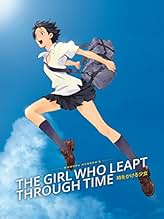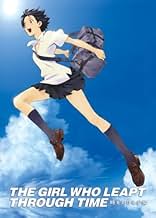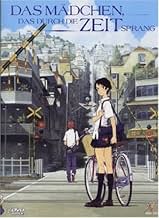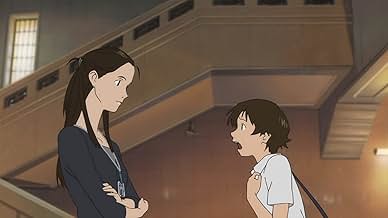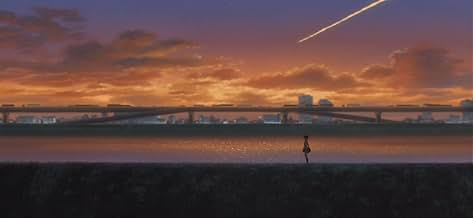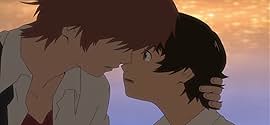Una niña de secundaria llamada Makoto adquiere el poder de viajar en el tiempo y decide usarlo para su beneficio personal. Poco sabe ella que está afectando las vidas de los demás tanto como... Leer todoUna niña de secundaria llamada Makoto adquiere el poder de viajar en el tiempo y decide usarlo para su beneficio personal. Poco sabe ella que está afectando las vidas de los demás tanto como la suya propia.Una niña de secundaria llamada Makoto adquiere el poder de viajar en el tiempo y decide usarlo para su beneficio personal. Poco sabe ella que está afectando las vidas de los demás tanto como la suya propia.
- Dirección
- Guión
- Reparto principal
- Premios
- 12 premios y 2 nominaciones en total
Reseñas destacadas
10oncex
This film is one of those films that comes once in every generation. The voice actors give the characters a sense of realness that makes you suffer or feel joy. The detail of the work is phenomenal and the story doesn't drag or end in a familiar way. I specially like the detail they put to little things as the sliding doors bouncing back open when Makoto tries to close them. This is one of those films that in the end it leaves you a good feeling and not guilty for spending two hours enjoying yourself. When you see this film you might have to find time to think when was the last time you saw something so good.I just wish there's a sequel for it, because I just couldn't get enough of it. But maybe is one of those stories that you wish it never ended but you know that it has to end.
P.S. Now I have to buy the DVD.
P.S. Now I have to buy the DVD.
10ethSin
There are about 10 Japanese films that I re-watch almost every year since their releases. "The Girl Who Leapt Through Time" is one of only three such animated films for me.
"The Girl Who Leapt Through Time" is based on a 1967 hit novel of the same title. The original work has been used in numerous film and dorama adaptations, most famous ones being the 1983 film directed by Oobayashi Nobuhiko. Instead of making just another anime adaptation and possibly becoming just another adaptation shadowed by the 1983 film, the producers took a risk by creating a spin-off movie with the setting of about 20 years after the original story. The gamble paid off big time, as the animated film went on to win at least 23 awards worldwide.
The underlying theme in this movie was "the importance of living the moment". Our protagonist was given the power to leap back into time to correct her mistakes, only to realize later that the short-term gains only lead to greater losses that followed. The story was extremely well-constructed to teach the lesson of embracing things the way they are, and never run from confrontations, because once that moment gone, you'll never get it back.
The director for this film did a phenomenal job of pacing and creating many memorable moments, but it was the live-action film screenwriter Okudera Satoko, who really made a difference for this movie by composing a story out of number of time leaps that slowly developed the main characters and made so many epic scenes possible. Many anime screenwriters fail in movies because they incorporate too many characters, as it is common practice in series, into the limited 100 minute time-frame. What's remarkable about this piece of work is that it focuses on only three main characters. Even counting the secondary cast, there are only 8 characters in total who we are given the names of. The limited number of characters not only improved character development, it also allowed the story to focus on the underlying theme.
I was actually very uncertain about the viewing this year because I started watching a lot of TV anime again since the last viewing. However, the only new flaws I've noticed was the excessive still motion in some scenes and most backgrounds, and that the protagonist was being a bit overly insensitive in few instances, which made her character a bit unrealistic. Animation is years ahead of its time, and it still is an excellent example of what happens when music is in harmony with the story/animation. The insert song by Oku Hanako, IMO, is still the best selection ever made among hundreds of Japanese films, anime, and live-action doramas I've encountered. Ending theme is a truly poignant one that really captured the mood and made the story sink in, and the music score throughout the movie has been used perfectly to enhance the drama.
"The Girl Who Leapt Through Time" is a timeless masterpiece that made me want to cherish every moment, and it's a movie I expect myself to be re-watching for many more years to come.
"The Girl Who Leapt Through Time" is based on a 1967 hit novel of the same title. The original work has been used in numerous film and dorama adaptations, most famous ones being the 1983 film directed by Oobayashi Nobuhiko. Instead of making just another anime adaptation and possibly becoming just another adaptation shadowed by the 1983 film, the producers took a risk by creating a spin-off movie with the setting of about 20 years after the original story. The gamble paid off big time, as the animated film went on to win at least 23 awards worldwide.
The underlying theme in this movie was "the importance of living the moment". Our protagonist was given the power to leap back into time to correct her mistakes, only to realize later that the short-term gains only lead to greater losses that followed. The story was extremely well-constructed to teach the lesson of embracing things the way they are, and never run from confrontations, because once that moment gone, you'll never get it back.
The director for this film did a phenomenal job of pacing and creating many memorable moments, but it was the live-action film screenwriter Okudera Satoko, who really made a difference for this movie by composing a story out of number of time leaps that slowly developed the main characters and made so many epic scenes possible. Many anime screenwriters fail in movies because they incorporate too many characters, as it is common practice in series, into the limited 100 minute time-frame. What's remarkable about this piece of work is that it focuses on only three main characters. Even counting the secondary cast, there are only 8 characters in total who we are given the names of. The limited number of characters not only improved character development, it also allowed the story to focus on the underlying theme.
I was actually very uncertain about the viewing this year because I started watching a lot of TV anime again since the last viewing. However, the only new flaws I've noticed was the excessive still motion in some scenes and most backgrounds, and that the protagonist was being a bit overly insensitive in few instances, which made her character a bit unrealistic. Animation is years ahead of its time, and it still is an excellent example of what happens when music is in harmony with the story/animation. The insert song by Oku Hanako, IMO, is still the best selection ever made among hundreds of Japanese films, anime, and live-action doramas I've encountered. Ending theme is a truly poignant one that really captured the mood and made the story sink in, and the music score throughout the movie has been used perfectly to enhance the drama.
"The Girl Who Leapt Through Time" is a timeless masterpiece that made me want to cherish every moment, and it's a movie I expect myself to be re-watching for many more years to come.
Based on Yasutaka Tsutsui's 1967 novel, - which has been adapted several times over the years, including 1983's The Little Girl Who Conquered Time - The Girl Who Leapt Through Time is a charming mix of drama and romantic comedy, with a slight infusion of science fiction ideas. Makoto (Riisa Naka) is a high school girl who, through serendipity, gains the ability to leap back in time (but she only manages moments or hours back). She has platonic relationships with two high school boys, Chiaki (Takuya Ishida) and Kousuke (Mitsutaka Itakura), and they spend their time playing baseball.
With her new-found abilities, she does nothing spectacularly profound, and the films intentions aren't to comment on paradoxes or to shift the space-time continuum as is usually the case with time travel narratives. Makoto uses her abilities to repeat events that pleasure her, to ace a school test, and also to avoid certain embarrassing situations with her friends. But as her relationships with, particularly, Chiaki and Kousuke, her leaps become more personally profound, as she attempts to possibly save the people she cares for (within the context of small human moments of danger, and not the usual global/country catastrophes.
I love the fact that in Japan, they do not distinguish between live- action cinema and animated (anime if you like) films, they are all simply movies. Now I'm going to contradict this with a Western perspective: This beautifully animated film is a delight to view, with its traditional two-dimensions, it is evidence to the west that 3D, computer generated animation is not the overbearing format, and 2D is still a genuinely viable medium. The film is filled with charming human moments, both touching and thoughtful. Teenage comedies rarely have this level of tenderness of character, that also explores concepts of fate, the passage of time and the intricacies of small human moments, and the delicate nature of human relationships.
www.the-wrath-of-blog.blogspot.com
With her new-found abilities, she does nothing spectacularly profound, and the films intentions aren't to comment on paradoxes or to shift the space-time continuum as is usually the case with time travel narratives. Makoto uses her abilities to repeat events that pleasure her, to ace a school test, and also to avoid certain embarrassing situations with her friends. But as her relationships with, particularly, Chiaki and Kousuke, her leaps become more personally profound, as she attempts to possibly save the people she cares for (within the context of small human moments of danger, and not the usual global/country catastrophes.
I love the fact that in Japan, they do not distinguish between live- action cinema and animated (anime if you like) films, they are all simply movies. Now I'm going to contradict this with a Western perspective: This beautifully animated film is a delight to view, with its traditional two-dimensions, it is evidence to the west that 3D, computer generated animation is not the overbearing format, and 2D is still a genuinely viable medium. The film is filled with charming human moments, both touching and thoughtful. Teenage comedies rarely have this level of tenderness of character, that also explores concepts of fate, the passage of time and the intricacies of small human moments, and the delicate nature of human relationships.
www.the-wrath-of-blog.blogspot.com
"I wonder how someone was able to create such a beautiful painting, when it must have seemed that the world was coming to an end."
When high school student Makoto inadvertently discovers that she's gained the ability to leap (literally) backward through time, she immediately begins using it to her advantage - with little concern for how and why she's gained this mysterious power. No problem is too trivial to be solved by a little time travel, from pop quizzes to uncomfortable conversations. But, nothing in the past can be changed without consequence, and Makoto's frivolous use of her ability may result in one or more of her friends being lost forever.
The Girl Who Leapt Through Time is about as mainstream and accessible as anime gets. The characters are all pretty normal, likable, and relatable. There's a lot of humor in the first half of the story, while the last half is quite serious, heartfelt, and poignant. The animation and character designs are clean and smooth, and have a very modern appeal. The score has a lot of piano pieces that occasionally caught my ear in a very pleasant way.
I recommend this both to anime fans, and to those who aren't particularly familiar with eastern animation. The story is an entertaining mix of moments both somber and lighthearted, the characters are great, and the visuals were top-notch. The Girl Who Leapt Through Time isn't just a good animated movie, it's good by any standards.
When high school student Makoto inadvertently discovers that she's gained the ability to leap (literally) backward through time, she immediately begins using it to her advantage - with little concern for how and why she's gained this mysterious power. No problem is too trivial to be solved by a little time travel, from pop quizzes to uncomfortable conversations. But, nothing in the past can be changed without consequence, and Makoto's frivolous use of her ability may result in one or more of her friends being lost forever.
The Girl Who Leapt Through Time is about as mainstream and accessible as anime gets. The characters are all pretty normal, likable, and relatable. There's a lot of humor in the first half of the story, while the last half is quite serious, heartfelt, and poignant. The animation and character designs are clean and smooth, and have a very modern appeal. The score has a lot of piano pieces that occasionally caught my ear in a very pleasant way.
I recommend this both to anime fans, and to those who aren't particularly familiar with eastern animation. The story is an entertaining mix of moments both somber and lighthearted, the characters are great, and the visuals were top-notch. The Girl Who Leapt Through Time isn't just a good animated movie, it's good by any standards.
The poster of this animated movie looks a little suggestive, but nope, it's actually a wholesome time travel movie which explores a little on the vestment of such powers to a klutzy individual, as well as relationships, and the perennial question of what would anyone do if you have the ability to go back into time, and make changes presumably for the better.
The Girl Who Leapt Through Time tells a wonderful story centered on 3 friends, the tomboyish and clumsy Makoto Konono (voiced by Riisa Naka), and two hunks Chiaki Mamiya (Takuya Ishida) and Kousuke Tsuda (Mitsutaka Itakura). Theirs is a friendship formed after school at the baseball court where they spend quality time talking about typical teenage stuff. Things start to change however, when Makoto by accident gets the power to time travel, and in her own ditzy way, uses her new found abilities for "good" - directly for herself, or in some Emma like moments, to influence the outcome of relationships for her friends and play matchmaker.
And that's just scratching the tip of the iceberg. While it's animation style is kept simple and fairly straightforward, it doesn't compromise on the complexity of its storyline. Not that it serves to confuse, rather you'll be amazed by the amount of pathos the story contains, with its various subplots especially when the time travelling stuff kicks in. It has adult sensibilities in the treatment of the plot, and knows exactly when to hit the right emotional chords when warranted.
Although based on a book, the story here serves as a quasi-sequel of sorts which takes place some 20 years later, what I can say is that the love stories intertwined has its major one being able to touch like that in Be With You. I loved that movie, and watching how this bore some similarities, you can't help but feel the same emotions coming across in the same way, nevermind that the characters here are animated, as you can feel the pain, the love, and their despair. And that is something that I should say is difficult for the genre - they're not real persons on screen - but yet being able to evoke emotions and for one to react and empathize, definitely makes it powerful, and a cut above others. Something that our local animated films had failed to do in giving us cold characters and bastardized stories from folklore.
But it's not always all the time serious in tone or mood. The movie has light hearted moments, sometimes bordering on the slapstick, no thanks to the bumbling Makoto character. In a sequence, it was reminiscent of Chinese Odyssey starring Stephen Chow, where each time travel moment gets played ad nausem with different comedic effect. Undoing blunders as we see is not exactly Makoto's forte, and while she may be using her powers in a carefree way, with great powers come great responsibilities (sorry, can't resist that one!)
As usual, anyone can find fault with the time travel paradox which rears its ugly head in any time travel movie, but I would suggest that you park those thoughts aside, and enjoy the story that the Girl Who Leapt Through Time is telling. There are slight attempts at addressing it with its creation of totally new and different realities with each jump, but even then a major paradoxical flaw still exists. At its lowest denominator, the film reminds to seize the day like it's your last, do what's right, and don't be shy in telling someone how you feel about them.
The Best Animated Film of the recent Awards of the Japanese Academy, this film gets my vote of support too with its superbly emotional and touching tale, and with its similarities to that aspect of the film which I like to Be With You, it will be no surprise if this movie finds its way to my Top Ten of the year. Highly recommended!
The Girl Who Leapt Through Time tells a wonderful story centered on 3 friends, the tomboyish and clumsy Makoto Konono (voiced by Riisa Naka), and two hunks Chiaki Mamiya (Takuya Ishida) and Kousuke Tsuda (Mitsutaka Itakura). Theirs is a friendship formed after school at the baseball court where they spend quality time talking about typical teenage stuff. Things start to change however, when Makoto by accident gets the power to time travel, and in her own ditzy way, uses her new found abilities for "good" - directly for herself, or in some Emma like moments, to influence the outcome of relationships for her friends and play matchmaker.
And that's just scratching the tip of the iceberg. While it's animation style is kept simple and fairly straightforward, it doesn't compromise on the complexity of its storyline. Not that it serves to confuse, rather you'll be amazed by the amount of pathos the story contains, with its various subplots especially when the time travelling stuff kicks in. It has adult sensibilities in the treatment of the plot, and knows exactly when to hit the right emotional chords when warranted.
Although based on a book, the story here serves as a quasi-sequel of sorts which takes place some 20 years later, what I can say is that the love stories intertwined has its major one being able to touch like that in Be With You. I loved that movie, and watching how this bore some similarities, you can't help but feel the same emotions coming across in the same way, nevermind that the characters here are animated, as you can feel the pain, the love, and their despair. And that is something that I should say is difficult for the genre - they're not real persons on screen - but yet being able to evoke emotions and for one to react and empathize, definitely makes it powerful, and a cut above others. Something that our local animated films had failed to do in giving us cold characters and bastardized stories from folklore.
But it's not always all the time serious in tone or mood. The movie has light hearted moments, sometimes bordering on the slapstick, no thanks to the bumbling Makoto character. In a sequence, it was reminiscent of Chinese Odyssey starring Stephen Chow, where each time travel moment gets played ad nausem with different comedic effect. Undoing blunders as we see is not exactly Makoto's forte, and while she may be using her powers in a carefree way, with great powers come great responsibilities (sorry, can't resist that one!)
As usual, anyone can find fault with the time travel paradox which rears its ugly head in any time travel movie, but I would suggest that you park those thoughts aside, and enjoy the story that the Girl Who Leapt Through Time is telling. There are slight attempts at addressing it with its creation of totally new and different realities with each jump, but even then a major paradoxical flaw still exists. At its lowest denominator, the film reminds to seize the day like it's your last, do what's right, and don't be shy in telling someone how you feel about them.
The Best Animated Film of the recent Awards of the Japanese Academy, this film gets my vote of support too with its superbly emotional and touching tale, and with its similarities to that aspect of the film which I like to Be With You, it will be no surprise if this movie finds its way to my Top Ten of the year. Highly recommended!
¿Sabías que...?
- CuriosidadesThis movie is an indirect adaptation of Yasutaka Tsutsui's novel "The Girl Who Leapt Through Time" - the main character's aunt is Yoshiyama Kazuko, the protagonist of the novel.
- PifiasSpoiler: During the time-stop sequence Chiaki laments that he will not be able to see the painting he has come to the past for because it is in restoration and he will not be around the next day when it is put on the wall. But Makoto knows that the picture is worked on by her aunt and so they could just go upstairs and take a look at it (they may find the door locked but the possibility is not even mentioned). Chiaki's last jump could not have erased that memory because Makoto's knowledge predates the event.
- Citas
Yuri Hayakawa: [Makoto Leaves the room, then Yuri watches the Blackboard] Makoto: Time waits for no one
- ConexionesFeatured in Glass Reflection: The Girl Who Leapt Through Time (2010)
Selecciones populares
Inicia sesión para calificar y añadir a tu lista para recibir recomendaciones personalizadas
Detalles
- Fecha de lanzamiento
- País de origen
- Sitios oficiales
- Idioma
- Títulos en diferentes países
- La noia que saltava a través del temps
- Empresas productoras
- Ver más compañías en los créditos en IMDbPro
Taquilla
- Recaudación en todo el mundo
- 1.522.968 US$
- Duración
- 1h 38min(98 min)
- Color
- Mezcla de sonido
- Relación de aspecto
- 1.78 : 1
Contribuir a esta página
Sugerir un cambio o añadir el contenido que falta


